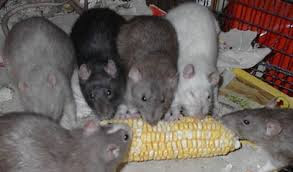
The world is faced with the issue of drug-resistance, super bugs and antibiotic residue in animal-by-products,forcing producers to look critically at methods of production and handling of products to resolve these issues.
The war against super bugs is super hot with various school of thoughts proposing various theories and solutions to resolve the issue to ensure better health for man and the food animals consumed.
The environment has been know to play host to various disease agents and the host/carriers are also housed in the environment,creating an unending cycle of infection to diverse hosts.
Rats are ubiquitous,with the propensity to carry disease agents in their urine,feces,hair and feet.These creatures could actually be the missing link in the antibiotic resistance saga.
Rats presence in poultry houses,farms and pet homes result in feed/water contamination with urine/feces resulting in salmonellosis,which the farmer responds to using antibiotics. When the source of infection is not removed, there will be a continuous cycle of infection-reinfection and treatment with various antibiotics .
The threat of rats to health of man and animals is real and must be properly understood to ensure the necessary strategy is incorporated. A recent study by scientist in the University of Colombia, has revealed the risk that rats pose:Rats can absorb disease agents from their local environment and spread them, according to a University of British Colombia new study. The results also indicate that the threat rats pose to the health of poultry and humans has been underestimated.
Researchers studied the feces of rats caught at an Abbotsford, B.C. poultry farm, and discovered they all carried avian pathogenic E. coli, a bacteria with the ability to cause disease in chickens and potentially humans. More than one quarter of the rats were carrying multi-drug resistant strains of the bacteria.
The findings support lead author Chelsea Himsworth's theory that rats act as a "pathogen sponge," soaking up bacteria from their environment.
If rats can absorb pathogenic E. coli, then they could potentially be a source of all sorts of other pathogens that we have not anticipated," said Himsworth, assistant professor in the UBC School of Population and Public Health and leader of the Vancouver Rat Project, a group aiming to address the knowledge gap about the health threats associated with rats.
Himsworth was surprised to find that the E. coli strains carried by the farm rats were very similar to those found in chickens, and totally different from E. coli strains found in urban rats. Basically, the rural rat gut looked like the poultry gut, and nothing like the urban rat gut .
This latest study follows previous research by Himsworth that found human pathogens, including MRSA (methicillin-resistant Staphylococcus aureus) and C. difficile, in the feces of rats in Vancouver's Downtown Eastside.
Rat infestations ought to be taken seriously," said Himsworth. "They need to be tackled with an educated, informed approach in collaboration with scientists and pest control professionals. There should be the development of municipal programs for managing rat infestations and rat-related issues.
Rodent control # rodenticide rodent bait # rodent proof.






